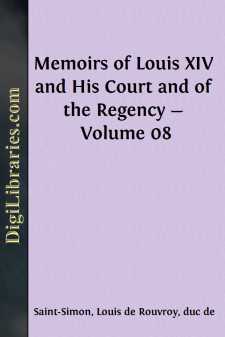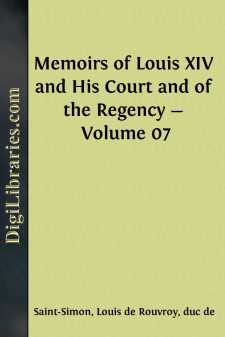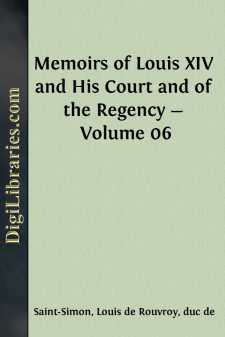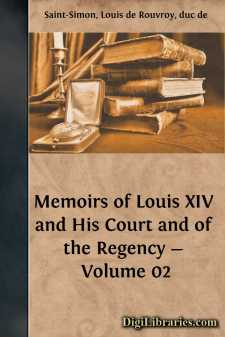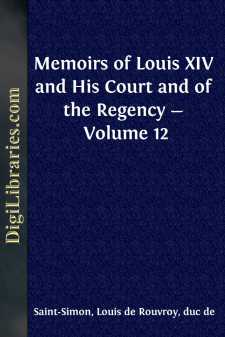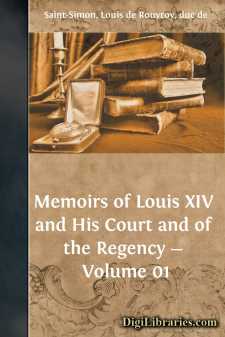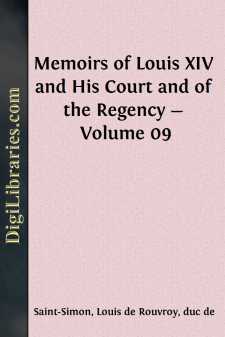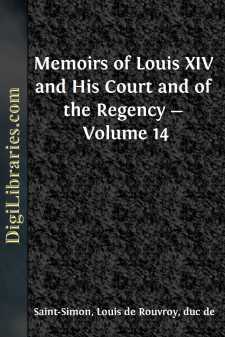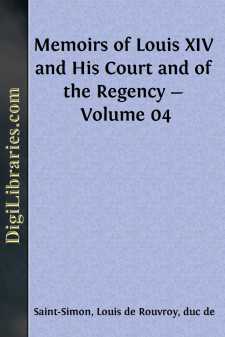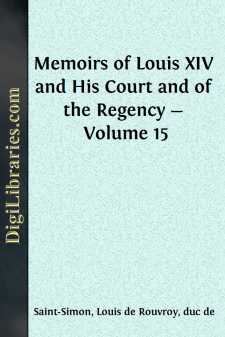Categories
- Antiques & Collectibles 13
- Architecture 36
- Art 48
- Bibles 22
- Biography & Autobiography 813
- Body, Mind & Spirit 142
- Business & Economics 28
- Children's Books 16
- Children's Fiction 13
- Computers 4
- Cooking 94
- Crafts & Hobbies 4
- Drama 346
- Education 46
- Family & Relationships 57
- Fiction 11829
- Games 19
- Gardening 17
- Health & Fitness 34
- History 1377
- House & Home 1
- Humor 147
- Juvenile Fiction 1873
- Juvenile Nonfiction 202
- Language Arts & Disciplines 88
- Law 16
- Literary Collections 686
- Literary Criticism 179
- Mathematics 13
- Medical 41
- Music 40
- Nature 179
- Non-Classifiable 1768
- Performing Arts 7
- Periodicals 1453
- Philosophy 64
- Photography 2
- Poetry 896
- Political Science 203
- Psychology 42
- Reference 154
- Religion 513
- Science 126
- Self-Help 84
- Social Science 81
- Sports & Recreation 34
- Study Aids 3
- Technology & Engineering 59
- Transportation 23
- Travel 463
- True Crime 29
Memoirs of Louis XIV and His Court and of the Regency - Volume 08
Description:
Excerpt
Although, as we have just seen, matters were beginning to brighten a little in Spain, they remained as dull and overcast as ever in France. The impossibility of obtaining peace, and the exhaustion of the realm, threw, the King into the most cruel anguish, and Desmarets into the saddest embarrassment. The paper of all kinds with which trade was inundated, and which had all more or less lost credit, made a chaos for which no remedy could be perceived. State-bills, bank-bills, receiver- general's-bills, title-bills, utensil-bills, were the ruin of private people, who were forced by the King to take them in payment, and who lost half, two-thirds, and sometimes more, by the transaction. This depreciation enriched the money people, at the expense of the public; and the circulation of money ceased, because there was no longer any money; because the King no longer paid anybody, but drew his revenues still; and because all the specie out of his control was locked up in the coffers of the possessors.
The capitation tax was doubled and trebled, at the will of the Intendants of the Provinces; merchandise and all kinds of provision were taxed to the amount of four times their value; new taxes of all kinds and upon all sorts of things were exacted; all this crushed nobles and roturiers, lords and clergy, and yet did not bring enough to the King, who drew the blood of all his subjects, squeezed out their very marrow, without distinction, and who enriched an army of tax-gatherers and officials of all kinds, in whose hands the best part of what was collected remained.
Desmarets, in whom the King had been forced to put all his confidence in finance matters, conceived the idea of establishing, in addition to so many taxes, that Royal Tithe upon all the property of each community and of each private person of the realm, that the Marechal de Vauban, on the one hand, and Boisguilbert on the other, had formerly proposed; but, as I have already described, as a simple and stile tax which would suffice for all, which would all enter the coffers of the King, and by means of which every other impost would be abolished.
We have seen what success this proposition met with; how the fanciers trembled at it; how the ministers blushed at it, with what anathemas it was rejected, and to what extent these two excellent and skilful citizens were disgraced. All this must be recollected here, since Desmarets, who had not lost sight of this system (not as relief and remedy—unpardonable crimes in the financial doctrine), now had recourse to it.
He imparted his project to three friends, Councillors of State, who examined it well, and worked hard to see how to overcome the obstacles which arose in the way of its execution. In the first place, it was necessary, in order to collect this tax, to draw from each person a clear statement of his wealth, of his debts, and so on. It was necessary to demand sure proofs on these points so as not to be deceived. Here was all the difficulty. Nothing was thought of the desolation this extra impost must cause to a prodigious number of men, or of their despair upon finding themselves obliged to disclose their family secrets; to hate a lamp thrown, as it were, upon their most delicate parts; all these things, I say, went for nothing. Less than a month sufficed these humane commissioners to render an account of this gentle project to the Cyclops who had charged them with it. Desmarets thereupon proposed it to the King, who, accustomed as he was to the most ruinous imposts, could not avoid being terrified at this. For a long while he had heard nothing talked of but the most extreme misery; this increase saddened him in a manner so evident, that his valets perceived it several days running, and were so disturbed at it, that Marechal (who related all this curious anecdote to me) made bold to speak to the King upon this sadness, fearing for his health. The King avowed to him that he felt infinite trouble, and threw himself vaguely upon the state of affairs....


